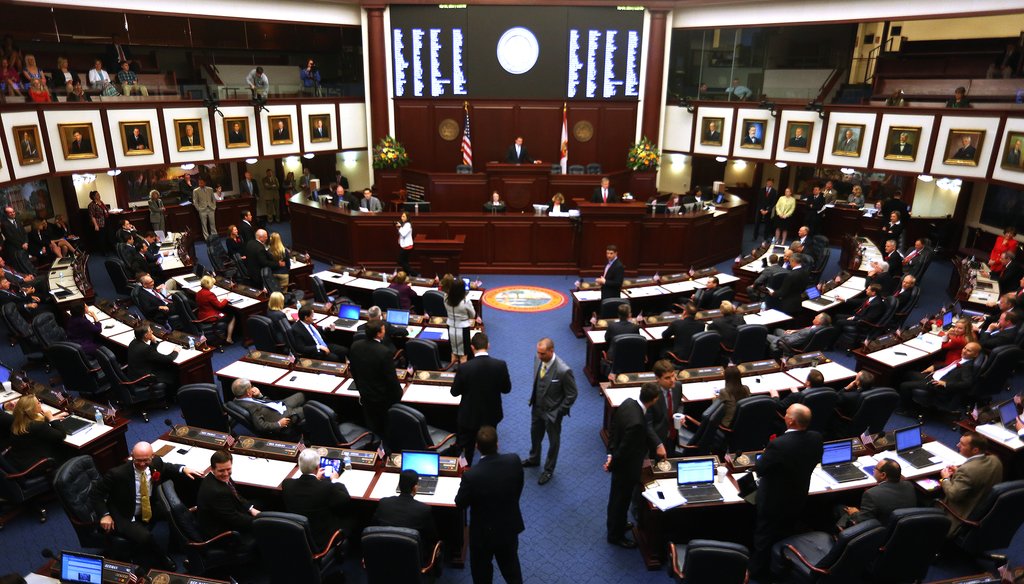Get PolitiFact in your inbox.

The Florida legislature will convene Tuesday. (2010 Times photo)
TALLAHASSEE — On the first day of the annual legislative session, everyone plays nice. The Capitol is filled with families and flower baskets. Lawmakers recline in plush leather chairs as leaders give speeches filled with inspiring words.
Yet on Opening Day, time is already slipping away. The Legislature has just 60 days — starting Tuesday — to write a state budget and pass new laws. When those nine weeks are over, time’s up.
The session moves at a frenetic pace. To an outsider, it looks chaotic, and it’s hard to figure out what’s happening. PolitiFact Florida presents this guide to session basics. We’ll get you ready before you can say "parliamentary procedure."
Bills, bills, bills
The civics-class version of how a bill becomes a law is this: A lawmaker sponsors a bill and finds a co-sponsor in the other chamber. If the bill clears all committees and both chambers, it goes to the governor to sign.
Between the two chambers, lawmakers usually file more than 2,000 bills each year. Already this year, we’ve seen bills to decriminalize 64-ounce containers of beer, ban red light cameras and arm teachers with guns.
House members typically may file up to six bills. Senators have no limit.
For most bills, chances of passage are poor. Only about 15 percent will survive floor fights and the governor’s scrutiny to become law, according to an average of passage rates for the past 12 years from the online bill-tracking service LobbyTools.
Since legislative leaders control the clock and the agenda, they may put priority bills on a fast track right to the chamber floor. Or they can slow a bill down by assigning it to multiple committees.
You can gauge a bill’s chances by the number of committees to which it’s assigned. The normal number is three. If it’s more, the bill is probably in trouble.
Consider SB 196, a measure to create a statewide domestic partnership registry, benefiting same-sex couples. The broad powers of the legislative leaders allow them to send bills to as many committees of jurisdiction as they deem appropriate. SB 196 received five committee stops.
The bill sponsor, Democratic Sen. Eleanor Sobel of Hollywood, managed to get the bill heard (she chaired the first committee the bill was assigned to). Even with that advantage, she had to postpone a vote on her bill — a move called TP, or temporarily pass — when it was obvious she didn’t have the votes to move it along.
On the floor
While Democrats and Republicans are expected to be on opposite sides, there can also be tensions within a party. Capitol insiders will pay close attention to the dynamic between two top Republicans: the popular young House Speaker Will Weatherford of Wesley Chapel and the professorial Sen. Don Gaetz of Niceville.
They presented a unified front in January, touting a five-point agenda called "Work Plan Florida." But history tells us the congeniality won’t last. Even Gaetz anticipates some tensions ahead. Pension reform, for example, is a big Weatherford priority that Gaetz sees differently.
"We’re not naive that we’re going to hold hands in the warm spring rain," Gaetz said.
Democrats, meanwhile, are in the minority, but they’re not quite as powerless as in years past. With a 76-44 party split in the House, Democrats gained five seats in the 2012 election, enough to take away the Republican supermajority that allowed the GOP to steamroll its agenda for the past two years.
No, Democrats still can’t win on an up-or-down party-line vote. But they can block late-filed amendments, stop a bill from being pulled out of a committee or make clerks read a bill word for word. In other words, the minority can kill bills by killing time.
"That’s a very, very important power that we reserve, largely because that 60-day clock is always ticking," said Rep. Mark Pafford, D-West Palm Beach.
Lobbyists and money
Lobbyists are sometimes more in the know than legislators. They know what’s in bills and are often more than happy to provide amendments that benefit their clients.
The lawmaker-to-lobbyist ratio is pretty lopsided. For the 160 members of the Legislature, roughly 2,000 people register to lobby them. That’s more than 12 lobbyists per lawmaker.
The budget
It’s the only bill lawmakers are required to pass, and negotiations almost always come down to the wire.
It’s traditionally the last official act of the legislative session.
Gov. Rick Scott released detailed recommendations for spending a $74.2 billion budget about a month ago. Lawmakers may use that as a starting point, or they can ignore it.
Scott has used the state budget to draw a contrast with the national government, saying Florida leaders made "tough choices" to keep state finances in order. That’s true, but only because they had to. Unlike the federal government, state leaders are required to pass a balanced budget.
Got it? If all goes smoothly you should be able to celebrate Sine Die — the Latin name of the ceremony that marks the end of the session — come May 3.
Katie Sanders is covering the legislative session for PolitiFact Florida. Email her ideas for facts to check at [email protected].
Our Sources
See individual fact-checks for complete sources












































